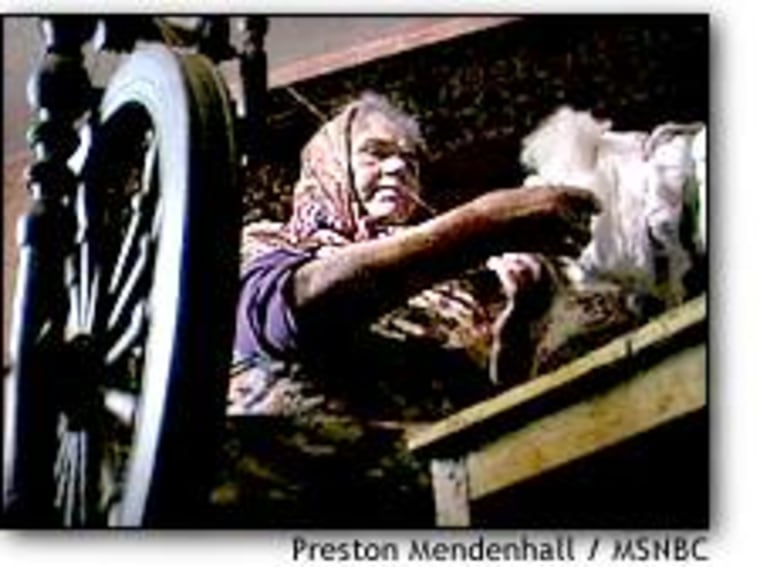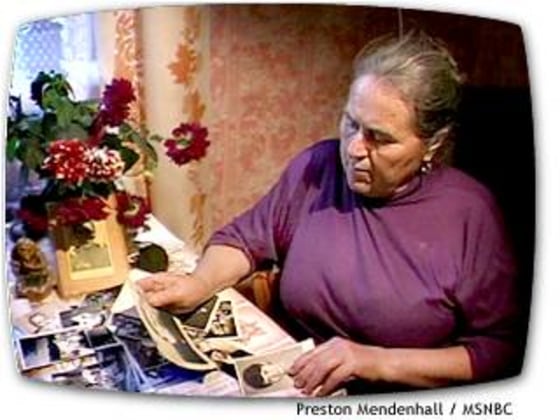Tatyana Roshkova eased her body down onto a stool in her living room to spin wool for socks to ward off the winter chill. Roshkova’s dress strained at the seams from the bulky sweaters she wears underneath to stay warm. Like millions of Russia’s elderly, she was preparing for another impossible winter: surviving on an irregularly paid state pension of $17 per month.
“The last time I bought new clothes was under Brezhnev,” Roshkova, 71, said, referring to the Soviet leader who died in 1982. “Life is difficult. Sometimes I think it would just be better to die.”
The past 10 years of reforms in Russia have been nothing short of an odyssey for Russia’s 38 million pensioners. In 1984, when Roshkova retired after 37 years as a veterinarian on a collective farm, or kolkhoz, she looked forward to the social safety net that was a staple of Soviet ideology. Her pension of 130 rubles, which is nearly impossible to calculate in today’s money, gave her plenty to eat and live decently.
The nearby kolkhoz meant that she had access to many products other Russians waited hours in line to obtain.
Roshkova even had enough change left over to buy the once bright floral patterned dress with wide lapels that she wears today. It was the last dress she ever bought - in 1982.
“We lived much better then. Our salaries were much higher,” she said. “Everybody got the same amount, and everything was cheap. You could buy everything you needed and live.”
But new clothes, unless she makes them herself, are a thing of the past. Roshkova has given up counting the years until the end of her life, now concentrating rather on the days she’ll survive on her meager existence.
Survival on Russia's ‘black earth’
Rozhdestvenskaya Khava, or Christmas Khava, the name of a nearby river, lies in the heart of Russia’s “black earth,” an agricultural zones in southern Russia, 350 miles south of Moscow named for its dark, fertile soil. Soviet leader Josef Stalin’s mass collectivization of farming killed millions and ruined the country’s agricultural production here during his reign. But it also gave people like Roshkova the know-how to earn 450 rubles a month, just over $17, which covered basic necessities in the Soviet era.

With the old certainties gone, that know-how has come in handy. In the backyard of her bungalow-sized house down the street from the kolkhoz, she raises chickens and ducks. Cabbage heads and tomato plants sprout from the dark soil, which Roshkova turns over each spring with a piece of metal stuck on a stump of wood. Instead of enjoying her golden years in her seventh decade, Roshkova spends her days spraying pesticides on an invading force of “Colorado beetles” and growing enough food until the next harvest.
“I can’t even remember the last time I had red meat,” Roshkova said. “I can only afford to buy one bottle of milk each week. If the damn beetles are too numerous, I don’t buy milk and spend the money on pesticides.”
Every month, the bills add up: food, gas for heating, oats for the animals, electricity, a 50 ruble ($2) loan to her son, who has two children. Adding insult to her struggle, the Kremlin has a poor record of timely pension payments. Although the government is currently up to date in her books, Roshkova waited for four months in 1999 without her monthly pension. Since 1991, Russia has been chronically delinquent in paying state wages and pensions with President Boris Yeltsin and his succession of prime ministers promising - but not delivering - relief for Russia’s elderly population.
Looking for a helping hand
Her 450 rubles are simply not enough, so Roshkova factors in handouts. The kolkhoz is somewhat mindful of its former workers and drops off a 5-pound sack of flour each year. Roshkova needs 25 pound per year in order to make bread. Buying a 25-cent loaf in the local bakery is too expensive.
“They just gave me some flour, sometimes some butter and oil. But they haven’t given me butter in a long time, and I don’t buy it because it’s too expensive.”
Roshkova’s husband died of lung cancer the same year they started at the kolkhoz, where the difficult work has taken its toll on her, too. Her forefingers jut off at near right angles from job-related accidents and she suffers from hypertension, for which she takes medication.
“When the Soviet Union collapsed, we thought life would get much better. Now everybody in power is a thief,” Roshkova said. “To have a job means to steal. If I had a job, I’m sure I would, too. But now I’m too old to work - or to steal.”
